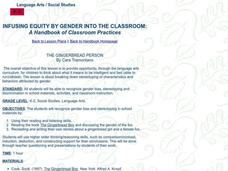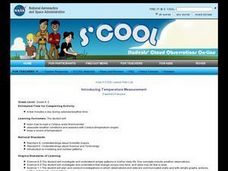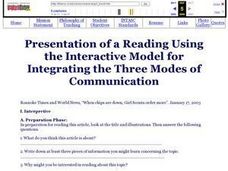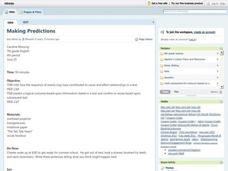University of North Carolina
Poetry Explications
Explication may sound like a fancy word, but it's just a fancy way to say analysis. Using a handout on poetry explications, part of a larger series on specific writing assignments, writers learn how to break down and analyze a poem. The...
New York State Education Department
TASC Transition Curriculum: Workshop 10
How have educational standards evolved? Educators of adults examine expectations in the 10th workshop out of 15 to better determine how standards have grown. Participants respond to a variety of sample questions to determine how they...
K20 LEARN
Trigger Warnings - Intellectual Rights and Responsibilities: Banned Books, Censorship Part 1
"Warning: Conducting this lesson may be harmful." Such statements, called "Trigger Warnings," are the focus of a two-part lesson that looks at censorship, especially the pros and cons of trigger warnings. Class members read two articles,...
K20 LEARN
Writing An Argumentative Paragraph: Argumentative Writing
Learning how to craft a cogent argument based on a solid claim, supported with evidence and solid reasoning, is an important life skill. Teach middle schoolers about argumentative writing with a lesson asking them to analyze the claims,...
Curated OER
The Gingerbread Person
Students think about what it means to be intelligent and fast (able to run)/athletic. After listening to the story, 'The Gingerbread Boy,' students write their own stories about a gingerbread girl and a female fox.
Curated OER
Simple machines
Students list and describe the six simple machines. They create a Thinking Map and outline using Kidspiration and create a paper on the importance of simple machines using Microsoft Word.
Curated OER
Little Pigs with Big Problems
First graders solve one problem per day regarding the story of Three Little Pigs. In this math journals lesson plan, 1st graders solve problems on a daily basis using the story of the Three Little Pigs.
Curated OER
String of Dots
You are Wilbur and your partner is Orville.The winner of this game gets to make the first flight in the Wright Flyer.
Develop a stratgegy for this one.Make a string of 15 to 30 dots. With a partner take turns crossing them off either...
Curated OER
Summer Water & Sand Activity: Go with the Flow
Students discover different materials that help to transport water in order to develop their observation and problem solving science skills. In this water lesson, students first brainstorm about different ways that water can be moved;...
Curated OER
Questions/Inferring
In this literature worksheet, students will analyze a story and prepare the chart by completing the two columns entitled "I wonder" and "I think" in accordance with a particular passage or piece of literature. Students will use...
Curated OER
Math Puzzle: Mind Benders
For this math puzzle worksheet, students complete a chart as they solve a puzzle and find which cat described belongs to which family member. An answer key is included.
Curated OER
Teen and Decision Making
Students examine how the brain develops. In this neurology lesson students read an article citing evidence that the different areas of the brain mature at different rates. They discuss emotional versus logical aspects of decision-making....
Curated OER
Getting Your "Hands-On" a Great Outline
Students write with controlled and/or subtle organization. They learn three ways to arrange a formal outline. Students demonstrate this knowledge by creating an outline as class. They cover the concepts of anticipation, investigation,...
Curated OER
Introducing Temperature Measurement
Students explore temperature and use Celcius thermometers to measure and graph the temperature in the classroom daily. They estimate what they think the temperature might be and then find the actual temperature in the room.
Curated OER
Girl Scout Cookie Lesson Plan
Students make a chart of the main categories and supporting details from the article," When chips are down, Girl Scouts order more." They compare their chart with that of a classmate. Students organize their ideas in a logical manner and...
Curated OER
The Ghost Particle
Students collect evidence to make inferences about a object hidden inside a sealed box. They think critically and logically to raise questions. Students identify questions that can be answered through investigation. They formulate and...
Curated OER
Making Predictions
Seventh graders read stories, stopping periodically to make predictions. They discuss how the sequence of events, as well as cause and effect, can give hints to the outcome of the story. In addition, 7th graders use logic and...
Curated OER
Making Connections
Students identify the main ideas in a passage from literature, and in a painting, and justify their conclusions using logic and language arts skills.
Curated OER
Story Parts
Third graders identify the three major parts of a story. After reading the book "Stellaluna," students discuss the beginning, middle and end of the story. They write a short story depicting the events that would happen if the story...
Curated OER
Lesson 3: Making Predictions
In this making predictions worksheet, students read a newspaper article, locate the "Five Ws and the H," and then make logical predictions on the content that they read and then analyze those predictions based on a rubric.
Curated OER
Scientific Problem Solving
In this problem solving worksheet, learners will put the 7 steps to problem solving in a logical order. Then students will design a hypothetical study comparing a person's weight on Earth with his weight on Mars and complete 3 short...
Curated OER
Primary History: Ancient Greeks - The Olympic Games
In this ancient Greeks learning exercise, student think logically about the statue of Zeus, its cost, and significance. They research Olympic events, and other Games before designing a program for the Olympic Games.
Curated OER
Maggie's Journal Brainteasers
For this Maggie's Journal brainteasers worksheet, students solve two word problems with logic and basic arithmetic skills.
Curated OER
Making a Water Filter
Fifth graders draw a plan that they think will clean the sludge in a jar. Students construct the treatment system they designed, take a bottle of sludge to the system and try it out, writing down what happened.

























